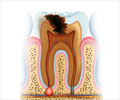Frequently Asked Questions
1. Which doctor should I go to for tooth sensitivity?If you're experiencing tooth sensitivity, it's best to start by visiting a dentist. Dentists specialize in diagnosing and treating dental conditions, including tooth sensitivity. They can assess your symptoms, determine the underlying cause, and recommend appropriate treatments or referrals to specialists if necessary. In some cases, you may be referred to an endodontist, who specializes in treating dental pulp and nerve-related issues, or a periodontist, who specializes in gum health.
2. Why do my teeth hurt when I eat sweets or acidic foods?
Eating sweets or acidic foods can cause tooth sensitivity because these substances can weaken enamel, exposing the underlying dentin layer. Dentin contains microscopic tubules that lead to the tooth's nerve center, causing discomfort when exposed to extreme temperatures or certain foods.
3. Can aggressive brushing cause tooth sensitivity?
Yes, aggressive brushing can wear down enamel and cause gum recession, leading to tooth sensitivity. It's essential to use a soft bristled toothbrush and gentle brushing technique to avoid further enamel erosion and gum damage.
4. What are the long term effects of untreated tooth sensitivity?
Untreated tooth sensitivity can lead to more severe dental issues, such as tooth decay, gum disease, and even tooth loss. It can also impact daily activities like eating and drinking, affecting overall quality of life.
5. How can I prevent tooth sensitivity during dental procedures like whitening?
Dentists often recommend using desensitizing toothpaste before and after dental procedures like whitening to minimize sensitivity. Additionally, discussing any concerns with your dentist beforehand can help tailor the treatment to your needs and minimize discomfort.
6. Is tooth sensitivity linked to certain medical conditions?
Yes, certain medical conditions like acid reflux, bulimia, or even sinus infections can contribute to tooth sensitivity. Managing these underlying conditions can help alleviate tooth sensitivity symptoms.
7. Are there natural remedies for managing tooth sensitivity at home?
Yes, natural remedies like rinsing with saltwater, practicing oil pulling with coconut oil, or applying a paste of baking soda can help reduce tooth sensitivity by soothing inflammation and neutralizing acids.
8. What role does genetics play in tooth sensitivity?
Genetics can influence susceptibility to tooth sensitivity. If family members experience sensitivity, there's a higher likelihood of inheriting similar dental traits. However, practicing good oral hygiene habits and preventative measures can help manage genetic predispositions.
9. Can stress exacerbate tooth sensitivity?
Yes, stress can contribute to teeth grinding or clenching, known as bruxism, which can wear down enamel and lead to tooth sensitivity. Managing stress through relaxation techniques or seeking professional help can alleviate this issue.
10. How does aging affect tooth sensitivity?
As we age, enamel naturally wears down, and gums may recede, exposing dentin and increasing the likelihood of tooth sensitivity. Additionally, older adults may be more prone to certain dental conditions that contribute to sensitivity, such as gum disease or dry mouth.
11. Are there specific dietary changes I can make to reduce tooth sensitivity?
Yes, avoiding acidic foods and beverages, reducing sugar intake, and opting for a balanced diet rich in calcium and vitamin D can help strengthen enamel and minimize tooth sensitivity. Drinking plenty of water and using a straw when consuming acidic drinks can also help protect teeth.










